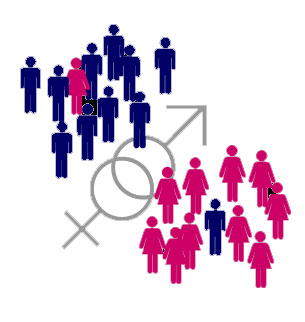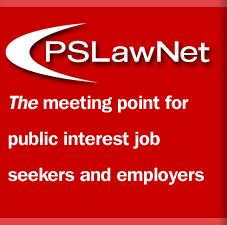Last June, our former NALP colleague Katie Dilks published an article asking “Why is Nobody Talking about Gender Diversity in Public Interest Law?” Katie noted that while a lot of time and effort is used analyzing gender gaps which disfavor female attorneys in law-firm practice and on the bench, there’s been little discussion of the fact that the tables are turned in the nonprofit arena:
[According to NALP’s 2004 After the J.D. report,] 9% (147) of the women surveyed worked in civil legal services or public defender offices, nonprofits or education, and public interest, while only 4% (71) of the men worked in these fields.

Nonprofit guys and gals, but mostly gals
More recent research by the National Legal Aid & Defender Association supports the idea of a notable gender gap in the civil legal services community, particularly among younger attorneys. The survey effort that led to NLADA’s 2007 report, It’s the Salaries, Stupid…And Much More, was focused mainly on gathering information from legal services attorneys 35 and younger about how salary and debt impacted their decision to remain in legal services or move to private practice. A startling data point emerged when the responses were broken down by gender: of the 786 survey respondents, 79% were female. 4 in 5. Wow.
We’ve now got some even fresher data which confirms a gender gap within nonprofit law offices. NALP’s 2010 Public Interest & Public Sector Attorney Salary Survey (final report available in NALP’s bookstore here), in addition to collecting salary data, also collected data about the gender makeup in public interest law offices. Among attorneys in civil legal services offices, 66% were female. (That 2 in 3 legal services attorneys are female might seem like good news in light of the 4-in-5 figure from the 2007 NLADA report. But recall that the NLADA data dealt only with attorneys 35 years old and younger. So it’s reasonable to at least wonder if the gender gap could be wider among younger attorneys.)
Beyond examining the more traditional legal services organizations, our 2010 Public Interest & Public Sector Salary Survey also collected gender data on attorneys working with issue-specific public interest organizations, in fields such as 1) housing/homelessness advocacy, 2) family/children advocacy, and 3) health/disability advocacy. Combining the data from these three categories, 76% of attorneys were female. (Two small notes here about our data-gathering: 1) the attorney figures we cite are for attorneys who spend at least the majority of their time on casework and advocacy, as opposed to those who are licensed attorneys but spend the majority of their time in management/administration roles; and 2) as to the three issue-specific categories, a very small number of respondents may work in government, but the vast, vast majority works with nonprofits.)
Interestingly, by comparison, attorneys working with local prosecutors’ and public defenders’ offices were split nearly 50/50 with respect to gender makeup.
There has long been discussion in the legal services community about the “why” – why is the community disproportionately female? One worrisome explanation which has been offered is that the low salaries (legal services salaries are basically at the back of the pack in the legal industry) ward off men, particularly those who feel a need to be significant breadwinners on the domestic front. In this circumstance, there is a tie-in between the gender makeup of an office and the salaries paid to attorneys. John Tobin, executive director of New Hampshire Legal Assistance, wrote in a 2003 Management Information Exchange Journal article:
“Legal services salaries are so low that many legal services staff are de facto subsidized by a spouse/partner, and a divorce/breakup can make the legal services person’s financial situation untenable. Legal services staffs are becoming disproportionately female. We must ask ourselves what role we are unwittingly playing in a culture that conditions women to work for less.”
We hope to explore these questions more in subsequent blog posts. But for now we just offer the above as food for thought…






















































